Manama Travel Guide
First mentioned in Islamic chronicles in the year 1345, historical Manama is now the capital and largest city of Bahrain at the northeastern tip of the Persian Gulf island state. There is a strong colonial influence in the area, with Portuguese occupation in 1521 followed by Persian dominance in 1602. This lovely city is a great base from which to enjoy the stunning beaches, buildings and sites in the area. The economy of Manama was traditionally based on pearling, fishing, boat building, and trade, displays of which can now be seen in local museums. In 1932, the discovery of petroleum boosted the city's economy, which has recently diversified into tourism and retail. Open-minded and tolerant of other cultures, Manama is visited by a large number of foreigners each year. These visitors can enjoy a vast array of attractions, from (markets) and shopping malls to forts and pearl museums. There is also an active nightlife with many popular restaurants, bars, and clubs to choose from, making this a splendid vacation destination.
Things to do in Manama
As the meeting place for locals and visitors and a fantastic way to experience the true flavours, scents, and colours of Manama, a visit to the souks (local markets) is a must. Here travellers can purchase anything from beautiful Persian rugs to rare and precious jewellery, all while sampling the local cuisine along the way.
If visitors venture just slightly out of the city, Bahrain's special history can be encountered in numerous old, though beautifully restored and preserved fort buildings that date back as far back as 3000 BC.
And when the temperatures of the desert seem overwhelming, water activities seem extra tempting. Luckily water sports are extremely popular in Bahrain, with tourists and locals indulging in their sport of choice all year round in the warm waters of the Persian Gulf. Sailing and scuba diving are particularly popular.
If travellers prefer to stay on land but still feel the need to cool down, they can visit the Lost Paradise of Dilmun Waterpark with the family, allowing kids to tube and slide the day away, while cooling off from the desert climate. Whether it is in the water or in the desert, there is plenty to choose from for the whole family.
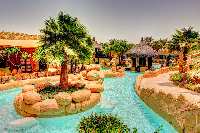
Lost Paradise of Dilmun Water Park
On a swelteringly hot day, the perfect activity for both children and adults in Bahrain is a trip to the Lost Paradise of Dilmun. The biggest waterpark in the Middle East, The Lost Paradise of Dilmun has a number of water rides and attractions catering for all ages, ranging from lazy rivers to high-speed waterslides, man-made waves to the interactive Dancing Fountain. The park was designed to resemble Dilmun, an ancient kingdom in Bahrain that was said to contain the Garden of Eden. Guests can also relax by the pool in private cabanas. The park also has restaurants and souvenir shops.
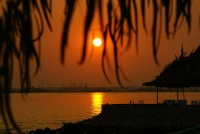
Al Dar Island
Al Dar Island is Bahrain's best-kept secret. A Mediterranean beach resort with sparkling blue seas, it offers activities such as dolphin viewing, pearl collecting, fishing, scuba diving, boating, and other water sports. Because Bahrain's beaches are notoriously poor, Al Dar is a popular excursion for both locals and tourists in Manama and all over the country. Though small, there are several beaches on Al Dar to choose from, none of which are overcrowded due to the strict limits regarding the number of visitors per day. The island is also known for its beach parties and lively nightlife.
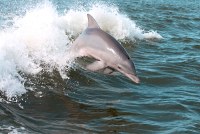
Hawar Islands
One-hour from Manama by boat, the Hawar Islands are a cluster of islands known for their spectacular scenery and wildlife. A UNESCO World Heritage Site, the Hawar Islands are home to playful dolphins and bright pink flocks of flamingos, and the islands' resorts offer the chance to relax and enjoy the tranquil surroundings while indulging in activities such as jet skiing, canoeing, cycling, and paddle boats. With a small population of around 4,000 people, tourism is the major industry. Although the islands are geographically closer to Qatar, Hawar belongs to Bahrain and makes a pleasant weekend excursion from Manama.
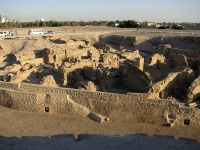
Bahrain Fort
Located roughly two miles (4km) from Manama along the coast of Bahrain, the archaeological site of Bahrain Fort (Qal'at al-Bahrain) is one of the largest in the country and has been listed as a World Heritage Site. As the capital of the ancient Silmun Civilisation, this site represents Bahrain's role as a centre for commerce and cultural exchange. Excavations have revealed the ruins of six cities near the fort, dating as far back as 3000 BC, though only 25 percent of the site has been uncovered. Visitors can see the remains of several necropolises along with city walls, and many copper and ivory artefacts and examples of Barbar pottery.
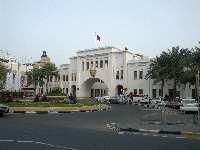
Manama Souk
To experience the true flavours, scents and colours of Manama, a visit to the souks (local markets) are a must. Here, visitors can experience and purchase everything this beautiful country has to offer, from a variety of cloths in different colours and textures to jewellery and local crafts. The best buys include exquisite Persian rugs and natural pearls. The fresh fruit and vegetables, herbs, spices, and nuts available here are also outstanding, though less ideal as souvenirs. The souk is divided into several sections, including the Fareeq el-Hammam and Fareeq el-Hatab, which are home to several famous Matams.
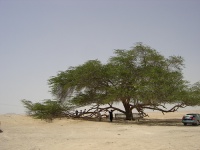
Jebel Al Dukhan and the Tree of Life
At 439 feet (134m) above sea level, the Jebel Al Dukhan hill is the highest point in Bahrain. Translated from Arabic, Jebel Al Dukhan means 'Mountain of Smoke', named for the haze that often surrounds it on humid days. There are various undetermined caves in the area for visitors to explore. Roughly a mile (2km) away, the Tree of Life stands alone in the desert, its water source a complete mystery. The mesquite tree is said to be around 400 years old, and stands 32 feet (10m) high. There is nothing else nearby to see or do. However, the mysterious tree is a popular sight for tourists in Bahrain.
Getting Around
There is little in the way of public transport in Manama, with most residents driving their own cars to get around. While long-haul buses link the major cities in Bahrain, local travel can be less organised and predictable for those visiting the capital city.
Taxis are perhaps the most popular way for travellers to get around Manama. There are plenty of cabs throughout the city, so finding a vacant one should not be much of a problem. Visitors should insist that the official meter is used, as it is extremely common for drivers to try and rip tourists off with an exorbitant fixed fee. If the driver is especially reluctant to use the meter, it is often best to simply vacate the cab and find another. There are surcharges for night-time fares (between 10pm and 6am), and hotel or airport pickups. Uber is also an option.
Hiring a car is the only other practical way to get around Manama, which is not considered pedestrian-friendly and has few sidewalks. All roads in Bahrain quite literally lead to Manama, so visitors who hire a car will also have considerable access to the whole country. Those who plan to stay within the city, however, will occasionally have to deal with periods of congested traffic, especially during rush hour.
Manama Climate and Weather
Manama experiences extreme climatic conditions, with summer temperatures in July rising to 102°F (39°C) and winter temperatures in January as low as 57°F (14°C). The most pleasant time to visit Manama is in autumn (October and November) when warm temperatures are tempered by a soft breeze. Manama has an arid climate with little rainfall.
Bahrain travel info
Electricity
Electrical current in Bahrain is 230 volts, 50Hz. UK-style three-pin plugs are used.
Language
Arabic is the official language in Bahrain, although English is widely understood and is used by most businesses.
Money
The official currency is the Bahraini dinar (BHD). The Bahraini dinar is linked to the US Dollar at a rate of US$1=BD 0.376. Money can be exchanged at bureaux de change, commercial banks in Manama or at money changers operating in souks. ATMs are available in larger towns. Credit cards are widely accepted.
Tipping
Most restaurants and hotels in Bahrain add a service charge of 10 to 15 percent to their bills. However, you may leave a tip at your discretion. Taxi drivers expect a 10 percent tip and porters will be happy with about 100 fils per item of baggage.
Health
Proof of a yellow fever vaccination is required for visitors who are coming from or have transited through an airport of a country where yellow fever occurs, and a hepatitis A vaccination is recommended. Medical facilities are good in the main cities, but health insurance is recommended because visitors must pay for treatment. There are many well-stocked pharmacies in the country. Water is deemed clean and safe by the authorities, but visitors usually prefer to drink bottled water, which is widely available.
Safety
Although the crime rate in Bahrain is relatively low, visitors should be aware that along with other states in the Gulf region, the country is at risk of indiscriminate terrorist attacks by Al Qaeda on Western interests. Visitors are advised to be vigilant and avoid public demonstrations. Around 6,000 to 8,000 British nationals live in Bahrain, and thousands more visit each year. The vast majority of visits are trouble free.
Local customs
Although it is a liberal state, Bahrain is an Islamic country and many locals find scanty clothing and immoderate public behaviour offensive. Visitors should dress and act respectfully. LGBT travellers should note that while the law doesn't criminalise same-sex activity between consenting adults who are at least 21 years of age, individuals have been punished in the past. Religious and social sensitivities should be observed and respected, especially during religious festivals. Foreigners are not expected to fast during the holy month of Ramadan, but it is considered extremely inconsiderate to eat, drink, or smoke in public during this time.
Doing business
Bahrain is generally more liberal than its Arab neighbours, but businesswomen should nevertheless ensure that they wear conservative clothing and men are expected to wear smart suits and ties. Bahrainis prefer to do business with those whom they have a personal relationship with so a letter of introduction from someone they know is appreciated.
English is used as the language of business, but expect prolonged small talk and personal enquiries before sitting down to do business, as building a trustworthy relationship is important. Rushing a deal and high-pressure sales tactics are frowned upon. Impatience has no place, so plenty of time should be allowed for decision-making.
For meetings, punctuality is important and business cards are routinely handed out to everyone, using both hands and preferably with the Arabic translation on the back of the card face up. It is important to study a received card for a while before putting it away. Formal titles should be used.
Business hours are Sunday to Thursday 7am to 2pm. Most businesses take a break in the afternoon between 1pm and 3pm, but are open later in the evening. During the holy month of Ramadan working hours are reduced.
Duty free
Travellers to Bahrain over 18 years do not have to pay duty on 400 cigarettes, 50 cigars and 250g tobacco (in open packets); perfume up to 237ml; 1 litre alcoholic liquor and 6 cans of beer for non-Muslim passengers only; and gifts to the value of BD 250.
Communications
The international direct dialling code for Bahrain is +973. As international roaming costs can be high, purchasing a local prepaid SIM card can be a cheaper option. Internet is available at most of the larger hotels in Manama.
Passport & Visa
All persons who wish to enter Bahrain need a visa, except citizens of the Gulf Cooperation Council (Kuwait, Oman, Qatar, Saudi Arabia, United Arab Emirates). Visas can be obtained on arrival or online at www.evisa.gov.bh. Not all nationalities qualify for visas on arrival. A passport valid for duration of stay is required, but it is recommended that passports be valid for at least six months beyond intended travel. Visitors also require tickets or documentation for return or onward travel as well as proof of sufficient funds and address of stay in Bahrain.
Entry requirements
US citizens require a passport that is valid for up to six months from the date of entry. The Government of Bahrain has reintroduced visas on-arrival.
UK citizens require a passport that is valid for up to six months from the date of entry. The Government of Bahrain has reintroduced visas on-arrival.
Canadian citizens require a passport that is valid for up to six months from the date of departure. The Government of Bahrain has reintroduced visas on-arrival.
Australians citizens require a passport that is valid for up to six months from the date of departure. The Government of Bahrain has reintroduced visas on-arrival.
South Africans citizens require a passport that is valid for up to six months from the date of departure. The Government of Bahrain has reintroduced visas on-arrival.
Irish citizens require a passport that is valid for up to six months from the date of departure. The Government of Bahrain has reintroduced visas on-arrival.
New Zealanders require a passport that is valid for up to six months from the date of departure. The Government of Bahrain has reintroduced visas on-arrival.
Useful contacts
Bahrain Tourist Office, Manama: +973 1755 8800 or www.btea.bh.
999 (General Emergencies)Embassies / consulates in other countries
Embassy of Bahrain, Washington DC, United States: +1 202 342 1111.
Embassy of Bahrain, London, United Kingdom (also responsible for Ireland): +44 020 7201 9170.
Embassies / consulates in Bahrain
United States Embassy, Manama: +973 1724 2700.
British Embassy, Manama: +973 1757 4100.
Canadian Embassy, Riyadh, Saudi Arabia (also responsible for Bahrain): +966 1 488 2288.
Australian Embassy, Riyadh, Saudi Arabia (also responsible for Bahrain): +966 11 250 0900.
South African Embassy, Riyadh, Saudi Arabia (also responsible for Bahrain): +966 1 442 9716.
Irish Embassy, Riyadh, Saudi Arabia (also responsible for Bahrain): +966 1 488 2300.
New Zealand Embassy, Riyadh, Saudi Arabia (also responsible for Bahrain): +966 1 488 7988.



